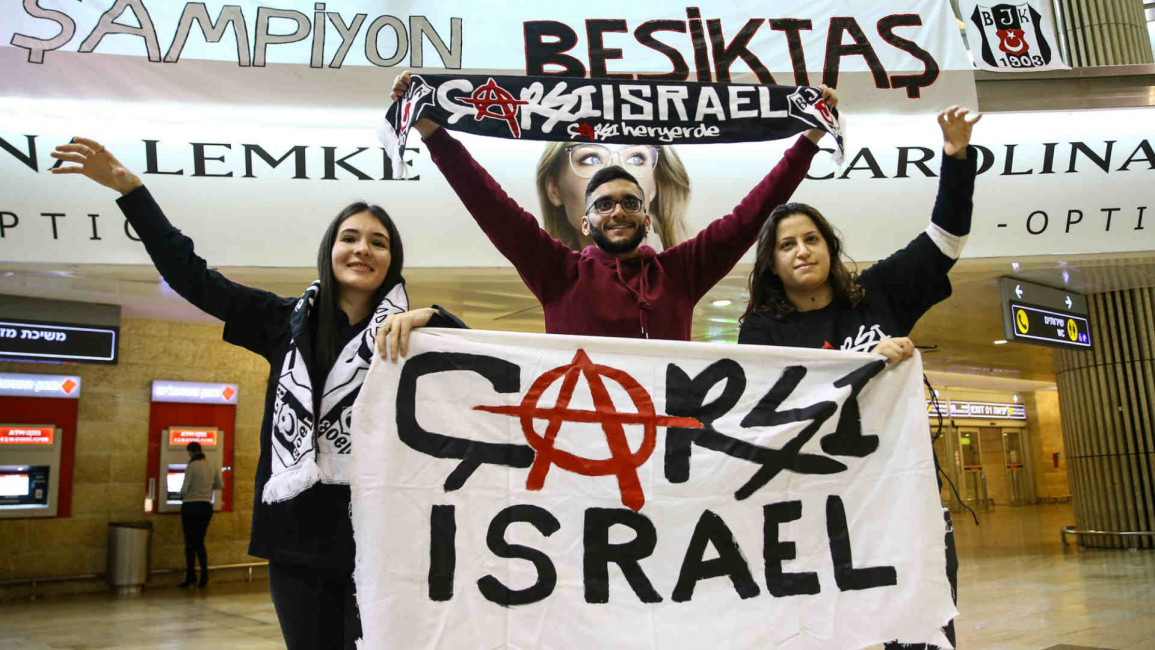
Europa League preview: Turkish giants face Israel's Be'er Sheva
"It's true we did not know much of Hapoel Be'er Sheva before the draw, we heard only about teams from Tel Aviv," said Beşiktaş manager Şenol Güneş.
"But after the past few weeks - there is no detail that we do not know about this excellent team."
Güneş was speaking yesterday at the Turner Stadium in Be'er Sheva, in Israel, ahead of the knock-out clash between the two clubs in the Europa League's last 32.
In recent weeks, the Turkish club's scouts have been closely studying coach Barak Bakhar's squad in their games at the Turner.
Güneş may be aware of the dangerous players among his rivals - but if he was interested in history, he probably had heard of Be'er Sheva, the city and the team, long before he heard about the teams from Tel Aviv. Then, he would have understood that his team's visit to this southern city has also a fascinating historical significance.
At the end of the 19th century, the Ottoman Turkish Empire, then in advanced stages of collapse, attempted to expand its imperial presence in the peripheral districts of Ottoman Palestine.
 |
At the end of the 19th century, the Ottoman Turks saw Be'er Sheva as a city with a much greater strategic importance than Tel Aviv, that's for sure |  |
Be'er Sheva has always been an attractive destination for investment. The Ottoman aspirations to neutralise control of the Bedouin tribes in the area, together with the need to strengthen the border with Egypt - controlled by the United Kingdom at the time - were the reasons for the city's establishment.
The fact that Be'er Sheva was sitting on a strategic crossroads both economically and geopolitically motivated the Ottomans to establish a regional trading centre connecting the routes between Gaza, the Gulf of Aqaba and Hebron. Already in 1877 the pedestrian town was recognized as a city, and in 1900, Be'er Sheva was officially declared by Governor Kemal Pasha as the new county capital of Be'er Sheva district.
At the end of the 19th century, the Ottoman Turks saw Be'er Sheva as a city with a much greater strategic importance than Tel Aviv, that's for sure.
In October 1915, as part of his railway project, Ottoman Sultan Abdul Hamid II inaugurated a railway station in the city.
The station had an important goal - to be a central point in the connection between Ismailia, Egypt, and Damascus, Syria. Due to its strategic location, it could also connect the port of Gaza with the emerging commercial centre in Be'er Sheva, then on to Hebron and to Amman, eventually linking up with the Hejazi railroad tracks - leading from Istanbul to Mecca.
During the First World War, the station became a key logistical point for the Ottomans and the Germans, moving supplies, weapons and troops between the Egyptian front and the Syrian rearguard, into the depths of the Empire. In the frenzied regional reality of the time, you could say cautiously that Ottoman Be'er Sheva had a significant role, and the Turks also intended it to be a main focus of efforts to revive the empire after the war.
 |
|
But anyway, back to football.
Hapoel Be'er Sheva dazzled in the Europa League group stage after knocking out the Premier League's Southampton. The club has been on a positive run for the past few years, slowly progressing and becoming a major power in Israeli football.
The club is owned by Alona Barkat, the first woman in Israel to own and run a football club, and last season won its first championship title in its 40 year history. The club is playing in the brand new Turner Stadium, a 16,000 seat venue that hosts tremendous displays of support from the "Ultra South" fan group - and one of the best atmospheres in the Europa League this season.
For years Hapoel Be'er Sheva was thought of as an underdog. The city itself was deemed a periphery in the middle of the desert, suffering from minimal budgets and discrimination from the Israeli authorities who preferred to invest in Tel Aviv and Jerusalem.
Four years ago the club was almost relegated to the second division, but the club has endured on an arduous journey, winning the championship and going on to play in Europe.
Among the notable players you can find the Nigerians Anthony Nwakame and John Ogu, Maharan Radhi - a Palestinian citizen of Israel, as well as Maor Melikson, Maor Buzaglo, and the captain Elyaniv Barda.
Turkish champions Beşiktaş are one of the three largest clubs in Istanbul. While Galatasaray was always considered the city's traditionally elite club, Beşiktaş, like Fenerbahçe, is considered to draw its support from the working class.
While the narrative surrounding Fenerbahçe is national and patriotic, the social and political nature of Beşiktaş support tends more to the left. The club's senior ultras group is named Çarşı, and its members boast quite a few trappings of anarchist tradition.
The club coordinates competitions across 14 sports including chess, table tennis, rowing and games. The Vodafone Arena has 41,903 seats and is considered one of the world's most impressive stadia.
 |
Both champions, coming from first place in their leagues, come with problematic momentum |  |
Beşiktaş has an impressive squad, on a top European scale. Among its most prominent stars are Portuguese European champion Ricardo Quaresma, Brazilian Anderson Talisca, local boy Cenk Tucson and Dutch trouble-maker Ryan Babel.
Adriano, Demba Ba and the African Cup of Nations winner, Cameroon's Vincent Abubakar, will not play due to a mix of injuries and suspensions.
Despite Beşiktaş being a well-established club with a 114-year history - and a budget 10 times higher than Hapoel Be'er Sheva's (125$ million vs 12.5$ million, respectively), there are distinct similarities between the two teams.
Both champions, coming from first place in their leagues, come with problematic momentum. The Turks are with two defeats in a row, while the Israeli team is erratic and playing negative football.
It is not Beşiktaş' first time in Israel. In the summer of 1999, they played Hapoel Haifa for the Champions League qualifiers - and were eliminated after two draws, thanks to away goals.
They played Maccabi Tel Aviv and won twice in the Europa League in 2011. In fact, Beşiktaş has not lost to an Israeli club. Never. Not in Israel, not in Istanbul.
Back to the history class.
Not surprisingly the grandiose plans of Sultan Abdul Hamid II failed to materialise.
With the evolution of the First World War, the Ottomans began to lose territories one by one, and the Turkish cavalry were helpless against West European guns. One of the most important battles for the future of the region was decided here in Be'er Sheva.
On the morning of October 31, 1917, General Allenby led an Egyptian expeditionary force - armed with British weapons - to a surprise attack on the city of Be'er Sheva, and defeated the Ottoman army and its German partners.
The victory in Be'er Sheva paved the way for a general defeat of the Ottomans in the Levant, the transfer of control of the country to the British, and, three days later - the Balfour Declaration - changing the region forever.
Hapoel Be'er Sheva doesn't stand much of a chance against Beşiktaş. The Turkish team is stronger, richer and boasts a far greater depth of quality in its squad.
But Hapoel Be'er Sheva's may yet find some magic in this, the most Middle Eastern clash in the history of the Europa League, 100 years since the last defeat of a Turkish team in this city.
It is a game which may yet be remembered for another century to come.
Uri Levy runs the popular football blog BabaGol, which covers football and politics focusing on the Middle East. Follow him on Twitter, and read his blog here.




